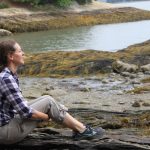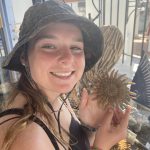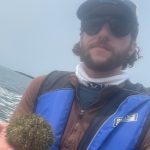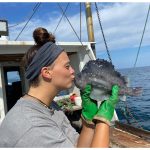People

Michelle Staudinger I am a marine ecologist and mother of twin boys, dedicated to making science accessible to everyone. I have over a decade of professional experience working in the fields of fish ecology, climate change, and marine conservation. Before coming to University of Maine, I worked for the U.S. Geological Survey and the Northeast Climate Adaptation Science Center located at the University of Massachusetts. My lab is located at the Darling Marine Center in Walpole, Maine.
Current lab members

Chloe Root (M.S. Student) My graduate project investigates the first-year growth and developmental phenology of the American lobster in the Gulf of Maine. I have a strong interest in marine invertebrate ecology and a passion for fisheries biology. Before starting graduate school, I worked for state agencies, specializing in aquaculture and endangered species research. In the future, I plan to continue conducting research that can be used to make informed fisheries management decisions.
 Chandler Sendek (PhD Student) I am an ecologist with an interest in rivers, estuaries, and coastal zones. These systems are all connected, and I take a holistic approach to influence robust management and conservation practices. I am particularly interested in invertebrates and their interactions with their environment. My research focuses specifically on the Green Sea Urchin fishery in the Gulf of Maine.
Chandler Sendek (PhD Student) I am an ecologist with an interest in rivers, estuaries, and coastal zones. These systems are all connected, and I take a holistic approach to influence robust management and conservation practices. I am particularly interested in invertebrates and their interactions with their environment. My research focuses specifically on the Green Sea Urchin fishery in the Gulf of Maine.
 Abby Remick (MS student) My research focuses on the foraging ecology of predatory fish and marine bird species in the Gulf of Maine. I want to understand how the diet composition of these two groups compare amongst a changing climate. Prior to my graduate experience, I worked heavily with the commercial fisheries industry which helped shape my interest in fisheries research. I am passionate about using a holistic approach to understand the connectivity that exists in nature and apply this to my graduate research and daily life as a naturalist driven by curiosity.
Abby Remick (MS student) My research focuses on the foraging ecology of predatory fish and marine bird species in the Gulf of Maine. I want to understand how the diet composition of these two groups compare amongst a changing climate. Prior to my graduate experience, I worked heavily with the commercial fisheries industry which helped shape my interest in fisheries research. I am passionate about using a holistic approach to understand the connectivity that exists in nature and apply this to my graduate research and daily life as a naturalist driven by curiosity.
 Hsiao-Yun Chang (Post-doc) I specialize in fisheries biology, marine ecology, and species distribution modeling under climate change as a fisheries scientist. My research revolves around understanding the response of aquatic species to climate change, particularly in terms of their distribution, ecology, and fisheries implications.
Hsiao-Yun Chang (Post-doc) I specialize in fisheries biology, marine ecology, and species distribution modeling under climate change as a fisheries scientist. My research revolves around understanding the response of aquatic species to climate change, particularly in terms of their distribution, ecology, and fisheries implications.
Past Lab Members
- Sarah Guitart (M.S., UMass Amherst, 2025) A novel trail camera diet monitoring protocol and its capacity to reflect Common and Roseate Tern chick provisioning.
- James Garner (PhD, UMass Amherst, 2025) Using eDNA to understand climate change and restoration impacts on diadromous fish populations.
- Aly Putnam (PhD, UMass Amherst, 2024) Climate impacts and vulnerability of intertidal biodiversity in the Boston Harbor.
- Amy Teffer (Post doc, NE CASC, 2023) Increasing Tribal climate adaptive capacity for coastal resources in the Northeast.
- Kevin Burgio (Post doc, NE CASC, 2023) A regional synthesis of climate data to inform the 2025 State Wildlife Action Plans in the Northeast U.S.
- Alice Lubeck (Post-M.S., NE CASC, 2023) A regional synthesis of climate data to inform the 2025 State Wildlife Action Plans in the Northeast U.S.
- Henry Legett (Post doc, NE CASC, 2022) How and why is the timing and occurrence of seasonal migrants in the Gulf of Maine changing due to climate?
- Amanda Davis (M.S., UMass Amherst, 2020) New England’s underutilized seafood species: defining and Exploring marketplace potential in a changing climate.
- Rebecca Dalton (PhD, Duke University, 2019) How and why is the timing and occurrence of seasonal migrants in the Gulf of Maine changing due to climate?
- Keenan Yakola (M.S., UMass Amherst, 2019) An examination of tern diets in a changing Gulf of Maine.
- Rachel Bratton (Honors Thesis, UMass Amherst, 2019) Using stable isotope analysis to examine the foraging ecology of tern species nesting in the Gulf of Maine.
- Valerie Dimkovikj (Post-B.S., Smithsonian Institute, 2014) Using stable isotopes from museum specimens of Illex illecebrosus to infer trophic changes across historical eras of New England fisheries.
